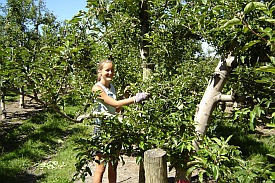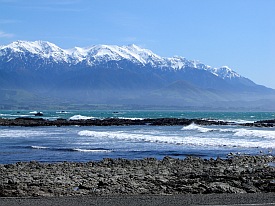By Amani Omejer
‘So, I’ve got my visa, now I need to organise a job…Where am I going to stay? I’d better book somewhere…’
These tend to be the thoughts that go through a first time traveler’s mind – certainly did with me anyway! I left school at 18 and got ready to spend 12 months away, travelling and working. With a work visa for New Zealand and a return flight to Australia, I wanted to try and be organized and slightly planned, because it not only puts your mind at rest, but also reassures the family and friends you are leaving behind. However, once you set off you realize one of the wonders of traveling is that you really do not need to plan!

Organic Farming Jobs in Australia
I began my travels in New Zealand and before I left I organized work in a vineyard for a few weeks, after seeing an advert on a website. One of the joys of working around a country such as New Zealand is that it caters perfectly for casual, seasonal workers, due to the number of farms and exported produce. No work came from the vineyard, so I found a job in a bar and worked there for a week.
You shouldn’t just wait for notices in windows of shops/cafés advertising vacancies – walk in, smile, be confident and you will be more likely to come out with a job than if you hang back. What you must remember is that employers have a high turn-over of staff, especially in popular places, and so tend to employ more people than usual.
Working Hostels
One top tip to those wanting to work and travel down under is to find a ‘working hostel.’ They are scattered around both Australia and New Zealand, and they help you to realize you do not need to organize jobs before you reach your destination. Have a peek in a Lonely Planet guide or travelers’ websites, so you can contact the hostels before arrival if you need peace of mind. The owners have contacts in the local area, so always have jobs available. Check which season you are visiting though because the vacancies often get filled quickly during low-season. Here’s a piece about youth hostels in Australia that you might find helpful.
The best thing about the hostels is the socializing. In any hostel, you will meet lots of people but at working hostels almost everyone is in the same boat as you, so when you come home after a hard day picking peas, or pruning apple trees, you can chill out with others. You also get the benefits of eating the produce, from pineapples to asparagus! Many people say that they would hate work like fruit-picking, but I feel that you should always have a go – it’s fun, sociable, and you keep fit whilst topping up your tan! If you do not like the job that you have been given, or you feel you are being mistreated or underpaid, don’t be afraid to voice your thoughts! Many people keep quiet and inevitably do not have such a good time. The owners are on your side, and they are always willing to help or find you another job.
In this type of work the wages vary enormously, and tend to be contract rather than hourly.
Contract work is the best if you are a hard worker, because you are paid by how much you pick or how many rows you prune, for example. Employers often have people that do not speak great English, so that they can take advantage of them easily. I found I became the spokesperson for my group, because what they can sometimes do is change the pay halfway through the jobs. As soon as they realize you have your wits about you, they tend not to mess you about again.
If you are only staying in a place for a couple of weeks, then this sort of work is ideal as employers follow the seasons and harvesting can sometimes only last two weeks. You could find yourself working with the locals, who vary from farmers who’ve been there for years, to young teenagers filling their summer holidays. This makes it really nice, because you feel more like a local, rather than a tourist.
When I was working in the awesome town of Queenstown, in New Zealand, I spent 6 months living in a hostel that was just like home, with a log-fire and young owners. I worked in a restaurant and a café, and got to know many of the locals so bagged a free hang-glide trip and cheap snowboarding equipment. When working in a town like Queenstown, you get a locals rate when booking onto adventure activities. The trick when working out how much you will get paid is not to convert it into English pounds! I was being paid NZ$12-13 (£4.50), which was a good rate for that time. You have to remember that it is all relative. The cost of living is so much cheaper, so you spend less.
New Zealand Ski Season Jobs
Many people love the idea of working a ski season in another country, and I was no exception. I bought my season pass for the mountains around Queenstown for £100, all my snowboarding kit for another £100 and I was set for 3 months of fun! If you are prepared to work hard and play hard then this is the life for you. Hitch-hiking up the mountain after a day at work is brilliant. New Zealanders are great people to work for and will always give you lifts up the mountain. The main tip, in contradiction to the rest of this article, is to plan and know by March whether you are going to be spending the winter season in the area. This will ensure you get the season pass cheaply, because from March onwards they steadily increase in price. The town is backpacker central, so after June it is virtually impossible to find a job because everybody else has got there first! The trick is to visit earlier in the year, spend the summer there or simply just get contacts, then travel the country and go back once the winter season begins.
Whitsunday Islands
Anyone who has visited Australia will know about the amazing Whitsunday Islands-Australia’s version of Paradise. Almost all backpackers spend 3 days on a boat, traveling around, snorkelling, diving and visiting the stunning beaches. Every boat has a skipper, a deckhand, and a host (i.e., cook), and often a volunteer that helps in all areas too. For those who love being on the water or simply want a challenge, I suggest volunteering on one of the many boats that do regular trips. I paid to go on one trip, loved it, and then visited companies in Airlie Beach (the gateway to the Whitsundays) until I found a boat to join. It is perfectly legal to work on the boats because you are getting food and accommodation in return, rather than money. The work is hard but you play hard too, so it’s well worth it. There are not many opportunities in life to wake up every morning to clear blue sea and turtles swimming around you!
If you have time to hang around, confidence and a basic knowledge of sailing, you’re probably ideally suited for a crewing job on a boat up the coast, or from one pacific island to another. The best place to look for a job such as this is on notice boards in yacht clubs.
Willing Workers on Organic Farms
Many travellers decide to WWOOF around the world (funny name I know, but it stands for Willing Workers on Organic Farms). If you are interested, you can become a member for a small cost, and you receive a booklet listing all the hosts in a specific country. Members do not need a work visa for the country, and can spend as little as a weekend with a household, or even a few months working from 2 to 6 hours a day, in return for food and accommodation. It is worth being wary of some places though, because they can take advantage of volunteers by making them work longer than 6 hours, so make sure you put your foot down! The best way is to commit to a short period of time, and then only extend your stay if you are truly happy.

Jobs Abroad in New Zealand
In Byron Bay in Australia, I WWOOFed for a really cool couple, working in their café for 4 hours a day. What is nice about this type of work is that you get your dose of home-life, as when you’ve been away for a while you tend to miss the cosiness of home.
When you travel you meet so many people along the way that it is easier if you can be flexible with your plans. If you are traveling solo, working abroad is a great way to meet potential traveling partners for a part of your trip.
Overall, I believe that it is so beneficial working in a country, rather than simply traveling around, taking pictures, and leaving. You feel more at home, make more friends (who you can visit another time!), whilst getting experience in varying fields of work.
The most important thing is to be confident and not be scared of not knowing exactly where you will be working, or what you will be doing, two weeks down the line.
My advice is to be spontaneous, and enjoy all that a new and exciting country can offer you!
Have Fun!